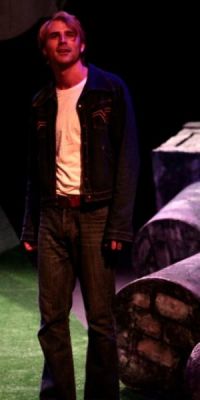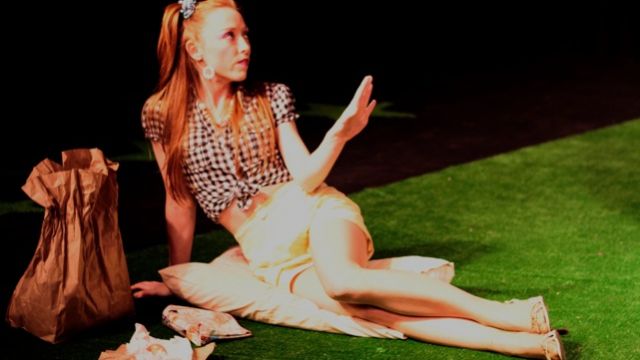Graceland and Asleep on the Wind
The back wall of the cavernous stage at Sidetrack Theatre is a tree of gold records, its trunk leading to the gates of Graceland just days before it is to be opened to the public in 1982 following Presley’s death.
Big time Elvis fan, Bev Davies (Michelle Collins), complete with tent, cooler and carry bag, arrives. Seeming to represent a perceived stereotype of middle-aged, middle class America, she is a little overweight, confident, strong, her peroxide blond curls shining. Determined to achieve another ‘first’ in her hero worship of ‘The King’, she intends to be the first person to enter the hallowed home of her hero.

Enter Rootie Mallert (Persia Blue). Young, very thin, heavily made up, hesitant, she hugs a pillow and carries a couple of paper bags. Eyes wide, suitably in awe, she sits on her pillow. She too – for quite different reasons - wants to be the first to enter Graceland. They see each other, and the contest begins.
Bev argues, Rootie pleads. Neither will concede. In the course of their verbal tug of war, we learn about both women, but it is Rootie with whom we sympathise. A motherless only daughter, brought up in a roughhouse family in the deep south, her brother Beau was her refuge. When he died in Vietnam, she was left his love of Elvis, the facts he had taught her about ‘The King’, and the questionable protection of his best friend, whom she married.
For Rootie, Graceland is more than a pilgrimage and we learn why in the second of these one act plays.
Asleep on the Wind is much more tautly structured and tightly written. Here we meet 14 year old Rootie, fearful, mistreated, anxious and the brother who is her hero. Beau (Leigh Scully) is a tease, but he is fun and caring. Here, in their special place – the tree-lined avenue and broken columns of an old, burnt out plantation – Blue and Scully establish the protective relationship that is the closest thing to love that Rootie will know.
Both actors make their characters very real. The push and pull of their dialogue demands varied pitch and pace and tempo. Beau’s playful teasing and Rootie’s insecure, teenage reactions lend themselves to action. Director Jo-anne Cahill has made the most of both the space and her actors’ physicality and fitness. Though much of the blocking is very demanding, it establishes the underlying restlessness of both characters, their need to escape …

And why Rootie is at Gracelands ten years later.
The second of the two plays is much more carefully constructed than the first.
In Graceland, the character of Bev is too stereotyped, too much a caricature to be made really believable. Though Collins makes a brave effort and finds some humour in the role, Bev remains two-dimensional. Even the character of Rootie here is more shallowly built, less vulnerable. Though it does serve to set the scene for the second play, it hasn’t that play’s depth or poignancy or ability to engage the emotions of the audience.
Both plays could stand on their own. In fact, Graceland could go down very well at the annual Elvis extravaganza in Parkes!
Âsleep on the Wind, however, is a much deeper and more demanding – and Operating Theatre’s production of it is very moving.
Carol Wimmer
Photographer: Sam Bruce.
Subscribe to our E-Newsletter, buy our latest print edition or find a Performing Arts book at Book Nook.

